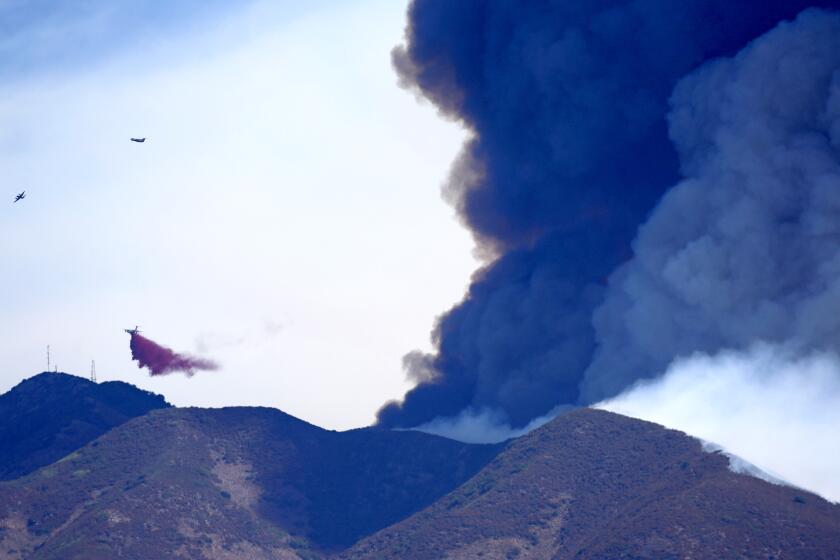Americans don’t trust the media, but their reasons often don’t add up [Updated]
This is a corrected version of the original post; see the note below.
It’s a drag to be a cultural villain. Lawyers, politicians, unionized teachers -- all have felt the sting of public disdain for their careers, their ethics, themselves. And then there’s the lowest of the low: journalists.
Being one of that species, I know there’s no way to defend the profession without appearing self-serving. But as I hear the unending criticisms of the media -- much of it coming from people who are media figures themselves, and part of it stemming from an intensive and purposeful campaign to discredit media outlets that don’t slant the news toward a conservative viewpoint -- I can’t help feeling that an awful lot of it reflects confusion and ignorance on the part of the critics.
Such critics are not hard to find. A recent Gallup poll showed that 60% of Americans don’t trust the media to report the news fully, accurately and fairly, a record high. I see examples of that worsening attitude daily, from conversations with people who blame the media for failing to report on what really matters, to vitriolic Facebook posts from friends who think the media are corporate slaves or liars, to TV commentators who blame the media for ... well, whatever’s in the news lately.
In my experience, people who are angry at or disillusioned by the media are often well educated. They also tend to be intense consumers of media, reading newspapers and magazines daily, scouring the Web for interesting news and often posting links to it on social media, and watching cable news shows or political satirists. So why do they keep devouring something they claim to dislike so much?
To get to the bottom of that, I thought I’d take a closer look at three recent attacks on the media by prominent critics: comedian Bill Maher, who blames the media for idolizing undecided voters; Fox Business Network’s Stuart Varney, who blames the media for failing to blame President Obama for high gasoline prices; and radio commentator Rush Limbaugh, who blames the media for ignoring revelations in an August column by conservative pundit Dinesh D’Souza that Obama is ignoring his half-brother. (I’m giving the majority of the focus to conservatives here because this is also the group that is maddest at the media; according to Gallup, only 26% of Republicans have a great deal or fair amount of trust in the media, compared with 58% of Democrats.)
The first thing one notices about this group is that every one of them is, in fact, a part of the media. So are Maher, Varney and Limbaugh really just mad at themselves? Actually, they seem to be mad at specific segments of the media.
Maher’s target, as best I can tell, are news reporters from traditional “mainstream” media outlets, such as newspapers and broadcast TV networks. To Maher, these reporters treat undecided voters “as if they were somehow more noble and discerning than the rest of us.” It’s a hilarious comedy bit, but his argument is flawed. What Maher interprets as idolization is really just good journalism.
It makes perfect sense to devote more news attention to undecided voters than partisans because, like it or not, this is the group that determines the outcome of presidential elections. That means their decisions matter more. Maher also appears to be upset that mainstream journalists simply report what these voters say, rather than pointing out that they’re idiots. Whether or not they’re really idiots, the traditional ethic of objectivity (not to mention libel law) prevents reporters from doing that. Would Maher be happier with news reporters if they focused on groups that don’t matter at election time, while also belittling them? Probably not.
The Varney and Limbaugh rants can be lumped together into what is a consistent line of attack by conservative pundits: The media are in the tank for Obama and the Democrats. Their criticisms have even less basis in reality than Maher’s.
Fox News, which is part of the largest media empire on Earth, somehow manages to persuade its audience to blame the rest of the media but not Fox for the nation’s problems by referring to its target as the “establishment” or “mainstream” media. Varney’s complaint, which is of course not directed at the plethora of conservative-labeled talk-radio hosts, bloggers and other media outlets, is that the nonpartisan media aren’t raising enough of a fuss about the connection between Obama’s energy policies and high gasoline prices, which only proves that they’re part of a liberal conspiracy to reelect the president.
This reflects a third-grader’s knowledge of how the gasoline market works, not to mention a third-grader’s memory of 6-year-old events. A seventh-grade primer on gasoline prices would point out that they’re currently high because oil prices are high, and oil prices have risen because of growing world demand, especially from rapidly developing countries such as India and China. (A college-level explanation would delve into the price of North Sea crude and its outsized influence on market prices for gas in the U.S.) Presidents have no influence over any of this.
Varney’s assertion that gas prices would be lower today if Obama had opened all desirable American oil fields and ocean waters for drilling four years ago, meanwhile, ignores that it generally takes decades to reach full oil production on a new site. And anyone who can remember back as far as 2006, when gas prices first started spiking in the U.S., would know that the “establishment media” were no more likely to blame President Bush for the problem than they are to blame Obama today.
Limbaugh’s beef is even more rancid than Varney’s. He thinks the media (again, that segment of the media that aren’t skewed in the conservative direction) betray their pro-Obama slant by failing to follow up on D’Souza’s revelations, in a column on FoxNews.com, about Obama’s African half-brother, George. D’Souza tells us that George needs money and can’t get the time of day from the Oval Office. He goes on to speculate, on the basis of no evidence, that the reason Obama is neglecting his brother is because George is a conservative. It couldn’t possibly be because, say, the president feels no connection whatsoever to this Kenyan sibling sired by a father who abandoned Barack Obama as a child.
The reason few respectable media outlets would choose to delve into this story is that to do so would be to reduce them to D’Souza’s level. This is sordid stuff, the equivalent of rummaging through the Oval Office dumpster in search of revelations about the president. Ethics, and a desire to maintain a decent reputation -- two things Limbaugh would know nothing about -- are the reasons establishment reporters aren’t breaking down George Obama’s door.
What the criticisms from Maher, Varney and Limbaugh have in common is that, with a closer look, none makes a lot of sense. But it’s unlikely their audiences are taking that closer look; most of them were no doubt nodding their heads as the three men spoke, bemoaning the underhandedness, dishonesty and foolishness of the media. Add in the other attacks piped in daily on talk radio, the Internet, cable TV and elsewhere, multiply it by the disdain heaped on the media by politicians, and you start to wonder what’s wrong with the 40% of Americans who still trust the media to deliver the news.
Another common element is that all three critics are really upset only with a particular segment of the media, even though they paint all the media with the same broad brush. Maher is upset with establishment news reporters, while Varney and Limbaugh don’t like non-conservative news reporters. But “the media” are so much more than this. Every blogger on the Internet is now part of the media. Columnists, satirists, sports reporters, weathermen -- all are part of the media. The Internet is exposing Americans to international news sources, such as Al Jazeera and the Guardian, that often have very different perspectives and outlooks than American news outlets.
The only thing you can truly say about the media, in fact, is that you can’t possibly say anything about the media that’s true. It might be true of some news outlets, or even several, but it can’t possibly be true of all, because the institution is simply too vast to categorize. This might explain why someone can rant to friends about how the media are a pack of liars, then sit down for a happy Sunday afternoon of reading the newspaper and catching up on news magazines, without noticing the inconsistency. For the most part, the media we think are bad are those news outlets we don’t actually pay attention to and are thus the least qualified to judge.
This doesn’t mean you can’t get angry about the way NBC News covered a particular story, or fire off an angry comment about how idiotic you find this blog post to be. Just don’t punish the entire media for our sins.
[For the record, added 2:07 p.m. on Sept. 27: The original version of this post incorrectly stated that 26% of Republicans distrust the media, vs. 58% of Democrats. Also, it incorrectly stated that Stuart Varney was with Fox News, rather than Fox Business Network.]
ALSO:
The pain-at-the-pump blame game
Prop. 34 and death penalty dishonesty
Violence, not replacement refs, will kill the NFL
Follow Dan Turner on Facebook
More to Read
A cure for the common opinion
Get thought-provoking perspectives with our weekly newsletter.
You may occasionally receive promotional content from the Los Angeles Times.










